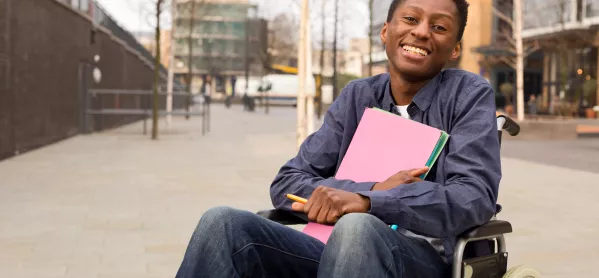
- Home
- ‘Changes to SEND legislation must be temporary’
‘Changes to SEND legislation must be temporary’

The year 2014 and the advent of the Children and Families Act seems a century ago as education providers cope with the impact of the Covid-19 pandemic. For those of us who work in the specialist sector, the arrival of education, health and care plans (EHCPs) and the guaranteed rights of all children and young people with EHCPs felt like a breakthrough moment.
While it has been far from plain sailing, it gave a structure and statutory rights for young people with special education needs and disability. More importantly, it provided, for the first time, a sense of security to young people and families, and, when implemented well, a true statutory document, which reflected their needs and wishes.
The revoking of those rights to provision during these unprecedented times has logic. No one would argue about the pressures that local authorities and all education, health and care professionals are coping with. Everyone is doing their best to sustain the outcome for the young people we support.
SEND: 'Changes to the law on EHCPs will have a serious impact'
Long read: 'Our young people aren't defined by their disability'
Coronavirus: Are vulnerable students safer in college?
Yet we also need to pause and consider how this is affecting the young people at the heart of what we do, as well as their families and the additional pressures they, too, are coping with.
Coronavirus: The challenge of supporting SEND students
About 60 per cent of National Star’s cohort have returned to college and our learning programmes and residential support team have had to learn to work in very different ways. All work is now residence-based to ensure Public Health England's and Wales’ "self-isolating households" guidance is followed.
For the education team, it means they are working with a group of students with a broad range of abilities and across multiple platforms and delivery methods, including direct delivery and virtual learning. This is helping to address the challenge of delivering ongoing learning for those 40 per cent of students shielding at home. Who would have thought tutors would be performing personalised rap songs over Microsoft Teams to engage a student with PMLD (profound and multiple learning difficulties)?
While the pandemic has had an impact on all students, the greatest impact is on those in their final year, preparing to leave National Star in July. They cannot simply choose where they want to live post-college and what they want to do.
Such decisions involve health care professionals, social workers and a myriad of other professionals. That transition process begins the moment a student starts at National Star and carries on as they leave to ensure that everything is in place. National Star works with staff in students’ home areas to ensure that the transition goes as smoothly as possible.
We encourage independent thought and support students in developing skills they will need beyond their time at college, yet the reality is that every single choice in their lives at the point of transition to adult life will ultimately depend on what is available to them. Worse still, they are unlikely even to know what these options will be until they are very close to leaving college, leaving little time for further preparation. While they can hope for the best of all worlds, they may yet receive options that are far from what they would choose for themselves.
That uncertainty has escalated with the pandemic as key transition activities have not been able to take places at this critical time. Many students were due to have care assessments or visit providers to finalise their transition plans that support this huge change in their lives. In many cases, this is not due to the lack of effort by the professionals involved, but a result of the restrictions in the way they can go about their work.
While remote support and creative teaching can enable students to work towards their outcomes, it is not the way to deliver transformative and sustained life skills, which young people will use throughout their lifetime. Residential learning still has a significant role to play.
'We need education, health and care to work together'
Just as the planning has started for the easing of lockdown and the return to the new normal, the need to do the same in SEND education is just as crucial.
The changes to the legislation must be a temporary measure if we are not to lose the positive impact EHCPs have provided for young people and their families.
More than ever, we need education, health and care to work together – more than some have done in the past. We, as a nation, have learned that education, health and care have to work together to be effective. It is not a case of either/or. Otherwise, we may end up with a forgotten cohort of young people, out of sight, out of mind.
Simon Welch is the principal at National Star College
Register with Tes and you can read five free articles every month, plus you'll have access to our range of award-winning newsletters.
Keep reading for just £4.90 per month
You've reached your limit of free articles this month. Subscribe for £4.90 per month for three months and get:
- Unlimited access to all Tes magazine content
- Exclusive subscriber-only stories
- Award-winning email newsletters
You've reached your limit of free articles this month. Subscribe for £4.90 per month for three months and get:
- Unlimited access to all Tes magazine content
- Exclusive subscriber-only stories
- Award-winning email newsletters